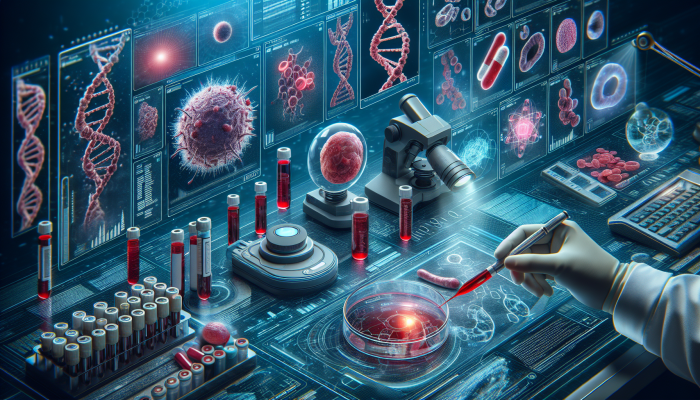Revolutionizing Cancer Diagnostics: The Impact of Advanced Blood Tests and Innovative Technologies
The realm of cancer detection is undergoing a remarkable transformation, significantly driven by the breakthroughs in blood tests for assessing cancer risk. These advanced tests signify a crucial change in the identification of potential cancer markers within the human body, enabling earlier interventions and substantially enhancing patient outcomes. To successfully navigate the intricate and often overwhelming domain of cancer diagnostics, it is essential to cultivate a detailed understanding of the fundamental principles that underpin these tests, along with the latest revolutionary advancements that are emerging in this vital area of healthcare.
Exploring the Intricate Mechanisms of Blood Tests for Cancer Risk: A Comprehensive Analysis

At the foundation of blood tests for cancer risk is the crucial detection of specific biological indicators known as biomarkers. These biomarkers act as vital signals indicating the presence of potential cancer or an elevated risk of developing it in the future. They encompass a wide variety of substances, such as proteins, genes, and an assortment of other materials produced either by cancerous cells or by the body’s immune response to the presence of cancer. The scientific foundation of these advanced tests relies on sophisticated methodologies that effectively identify these markers, utilizing an extensive range of cutting-edge technologies.
One of the foremost techniques employed in these evaluations is the liquid biopsy. This cutting-edge technique involves analyzing a blood sample to detect components such as circulating tumor DNA (ctDNA) and circulating tumor cells (CTCs). The non-invasive nature of this method allows for a thorough evaluation of a patient’s cancer risk without necessitating more invasive procedures like traditional biopsies. Furthermore, technological advancements, especially in next-generation sequencing (NGS), have greatly improved the sensitivity and specificity of these tests, enabling them to detect even the faintest traces of ctDNA.
The precision of blood tests for cancer risk is closely intertwined with our understanding of cancer biology. Various types of cancer release distinct biomarkers into the bloodstream, fueling ongoing research aimed at discovering new markers that can serve as early warning indicators. For example, monitoring levels of prostate-specific antigen (PSA) is a common method used to evaluate prostate cancer risk, while the CA-125 marker is often linked with the detection of ovarian cancer.
Additionally, the integration of artificial intelligence (AI) into the analysis of test results is significantly transforming this field. AI algorithms are capable of analyzing extensive datasets, uncovering patterns that might be overlooked by human analysis, thereby substantially enhancing the predictive accuracy of these tests.
Discovering Innovative Breakthroughs in Blood Tests for Cancer Risk: Key Developments
The field of blood tests for cancer risk is currently experiencing extraordinary breakthroughs that have the potential to redefine cancer screening and prevention strategies. A particularly noteworthy advancement is the advent of multi-cancer early detection (MCED) tests. These revolutionary tests are engineered to detect multiple types of cancer from a single blood sample, significantly reducing the necessity for invasive procedures and improving overall patient comfort and experience.
Recent research has demonstrated that MCED tests can successfully identify cancers at their earliest stages, often before any clinical symptoms arise. This early detection is crucial, as it is directly associated with enhanced treatment outcomes and improved survival rates. For instance, a study published in a prominent oncology journal highlighted the impressive capability of an MCED test to pinpoint malignancies that are typically challenging to diagnose in their initial stages, such as pancreatic cancer and ovarian cancer.
Another significant advancement in this area involves investigating methylation patterns present in circulating DNA as a diagnostic tool. Alterations in methylation often signal cancerous processes, encouraging researchers to explore how these patterns can be utilized for more accurate cancer risk assessment. This pioneering approach could offer a highly sensitive method for detecting cancers that currently lack effective screening protocols, thereby enhancing patient care.
Moreover, collaborations between technology companies and healthcare providers are propelling the creation of innovative diagnostic tools. These partnerships aim to leverage big data and machine learning to refine blood sample analysis, resulting in more precise risk assessments and tailored management strategies for patients.
Examining the Transformative Impact of Liquid Biopsies in Cancer Detection and Treatment Approaches
Liquid biopsies signify a groundbreaking advancement in the domain of blood tests for cancer risk. Unlike traditional biopsies that necessitate invasive tissue samples, liquid biopsies provide a minimally invasive alternative that can be conducted multiple times, allowing for continuous monitoring of cancer progression or responses to treatment. This capability is particularly advantageous for patients who may not be ideal candidates for surgical biopsies due to various health issues.
Liquid biopsies operate by isolating and analyzing ctDNA or CTCs extracted from a blood sample. The ability to observe these cellular components offers valuable insights into tumor dynamics and potential genetic mutations that may occur throughout the course of the disease. For example, identifying specific mutations can aid oncologists in selecting targeted therapies, thereby personalizing treatment plans for greater efficacy and success rates.
The integration of liquid biopsies into clinical settings is already yielding promising outcomes. Recent clinical trials have shown that these tests can detect recurrences in patients who have previously undergone cancer treatments, often several months in advance of traditional imaging techniques. This timely detection can facilitate prompt interventions, ultimately enhancing survival outcomes and overall patient health.
Furthermore, liquid biopsies enable real-time monitoring of treatment responses. By evaluating ctDNA levels during therapy, healthcare professionals can assess the effectiveness of the treatment regimen and make necessary adjustments to optimize patient care. This proactive approach to monitoring signifies a substantial shift toward a more dynamic management of cancer care, ensuring that patients receive the most suitable treatment tailored to their individual requirements.
In summary, blood tests for cancer risk, especially through the utilization of liquid biopsies, are revolutionizing the oncology landscape. Their potential for early detection, continuous monitoring of disease progression, and personalized treatment strategies positions them as invaluable tools in the ongoing battle against cancer. As research and technological advancements continue to progress, the outlook for these tests to enhance patient outcomes and reshape cancer care remains exceptionally promising and encouraging.
Join Our Facebook Community for the Latest Insights and Updates!

Originally Published On https://bloodtest.co.uk
The Article: Blood Tests for Cancer Risk: Pioneering Early Detection Methods was first featured on: https://ezbloodtest.com
The Article Cancer Risk Blood Tests: Innovative Methods for Early Detection Was Found On https://limitsofstrategy.com
The Article Cancer Risk Blood Tests: Cutting-Edge Early Detection Techniques First Appeared ON
: https://ad4sc.com

